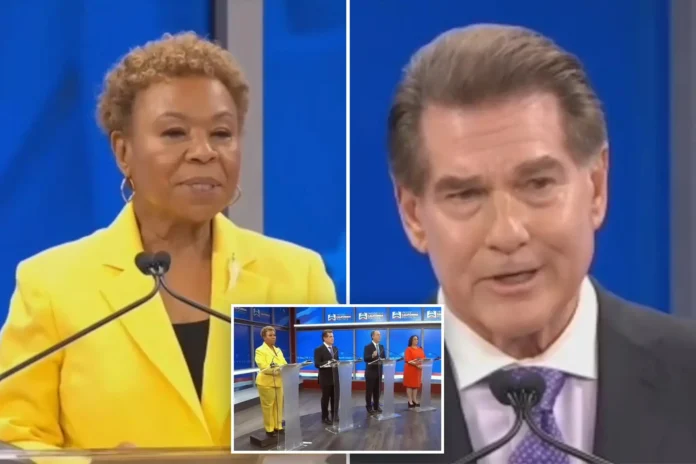California’s Senate race took a heated turn during a Monday night debate as candidates tackled the idea of raising the minimum wage to $50 an hour. The proposal, championed by Democrat Congresswoman Barbara Lee, sparked strong opinions on both sides of the stage.
Lee argued that California’s affordability crisis demands bold action. “In the Bay Area, a family of four needs $127,000 just to scrape by,” she said, referencing recent studies. “Even for a single person, $104,000 is considered low income. This isn’t about what’s convenient—it’s about what’s necessary.” Lee insisted that while national minimum wage increases to $20 or $25 an hour might be adequate elsewhere, California’s unique challenges call for a more aggressive approach.
Former MLB star and Republican candidate Steve Garvey pushed back, dismissing the idea as unsustainable. “Look at fast-food franchises already grappling with a $20 minimum wage,” he said. “The cost of a simple meal, like a Big Mac, is going to skyrocket from $9 to $15. It’s the average Californian who ends up paying the price.”
Democrat Rep. Adam Schiff countered Garvey’s argument by highlighting the human cost of low wages. “The reason we see so many people on the streets is because they’re earning poverty wages,” he said. “Try finding housing in California on the current minimum wage—it’s impossible.” Schiff, along with fellow Democrat Katie Porter, has supported raising the minimum wage to $20 or $25 per hour, seeing it as a step toward restoring dignity to low-wage workers.
California’s recently passed legislation requiring a $20 hourly minimum wage at large chain restaurants is already causing ripples. Major brands like McDonald’s and Chipotle have warned customers to expect higher prices, while Fat Brands Chair Andy Wiederhorn put it bluntly: “Someone’s got to pay for this.” He explained that businesses don’t have the profit margins to absorb the increase, so the costs will inevitably be passed to consumers.
Economists are also sounding alarms about the potential fallout. Some argue that higher wages could lead to fewer jobs, with companies cutting back on staff to manage rising expenses. E.J. Antoni, a research fellow at the Heritage Foundation, explained, “Raising the minimum wage often backfires. It’s not just about higher costs for businesses—it’s about lower employment. And the people who lose their jobs are usually the ones this policy is meant to help.”
Antoni also pointed out that low-income workers, who are more likely to rely on fast food, would feel the pinch of higher prices the most. “For someone who loses their job because of a wage hike, the real minimum wage becomes zero,” he said. “No income and higher prices are a brutal combination.”
As the debate rages on, one thing is clear: the question of how to balance fair wages with economic realities will remain a central issue in California’s Senate race—and beyond.





